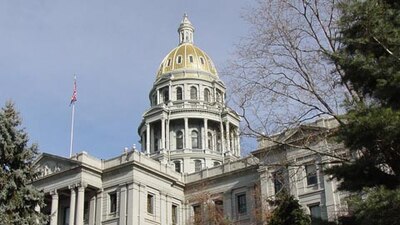Senate Finance Committee members cast a 4-3 party-line Tuesday to send Senate Concurrent Resolution 10-002 to the floor, where it’s expected to lose if it ever comes to a vote.
As a proposed constitutional amendment the resolution would have to pass by two-thirds majorities in each House, something not considered likely this year.
The resolution is the Senate version of the so-called DECIDE amendment, which proposes to allow the legislature to raise taxes for education spending without voter approval, something now required for all state tax increases by the Taxpayer’s Bill of Rights. The amendment would cover education from preschool to university.

SCR 10-002 already has passed the Senate Education Committee. A mirror measure, House Concurrent Resolution 10-1002, passed the House Education Committee and is pending on the floor. (Identical measures were introduced to ensure that the idea at least got committee hearings in each house.)
The committee approved an amendment by sponsor Sen. Suzanne Williams, D-Aurora that specifies the revenues from such taxes would go into a special education fund. The panel also approved an amendment proposed by Sen. Keith King, R-Colorado Springs. It says new education revenues shall “supplement” not “supplant” existing state education support. (King still voted against the resolution.)
The idea is being pushed by a coalition of advocacy groups called Great Futures Colorado, which was organized by Great Education Colorado. The measure is seen as a response to pending 2010-11 statewide cuts in K-12 spending and to cushion further cuts in 2011-12.
Discussion over the DECIDE idea has illuminated the divergent opinions that various elected officials and interest groups hold on the issues of school funding and state spending.
- Backers of the plan feel education funding needs a quick fix and that the decline of school spending is adversely affecting children’s futures and the state’s economy.
- Some TABOR critics see it as a way to chip away at that constitutional amendment’s fiscal restrictions.
- Conversely, some Republicans and conservatives oppose it because they believe it’s an attack on TABOR.
- Other legislators feel it’s bad policy to exempt one portion of state spending from TABOR while leaving other programs under its restrictions.
- Finally, there’s a preference among some elected officials and interest groups for proposing a more sweeping fiscal “fix” to voters in 2011.
DECIDE isn’t the only proposed constitutional amendment kicking around the Statehouse this year – 18 were proposed, although seven already have been killed.
There is a high bar for lawmakers to get measures to the ballot – two-thirds votes in each House. While Democrats currently hold majorities in both houses, they don’t have enough votes to meet the two-thirds requirement. (It’s common for measures to die in committee, especially those sponsored by members of the minority party.)
Here’s a rundown on this year’s proposed amendments, when they were introduced, their primary sponsorship and their status:
- HCR 10-1001 – Allows county commissioners to set county salaries instead of the legislature. Introduced March 17. Democratic. Killed in committee.
- HCR 10-1002 – Would allow the legislature to raise taxes for education without voter approval. March 30. Democratic. Awaiting House preliminary floor consideration.
- HCR 10-1003 – Would have allowed use of mineral severance tax revenues to support a rainy day fund. March 30. Republican. Killed in committee.
- HCR 10-1004 – Allowing designation of a temporary state capital in the event of a disaster. April 8. Bipartisan. Passed House, pending in Senate
- HCR 10-1005 – Would have made exempt from property tax certain possessory interests in real estate. April 23. Republican. Awaiting committee consideration.
- HCR 10-1006 – Requiring voter approval for tax policy changes. April 26. Republican. Awaiting committee consideration.
- HCR 10-1007 – In emergencies would have allowed shift some lottery revenues to education from outdoors programs. April 28. Republican. Killed in committee.
- HCR 10-1008 – Would make most federal and cash funds subject to legislative appropriation. April 26. Republican. Pending in committee.
- HCR 10-1009 – Would create a state contingency/rainy day fund. May 3. Republican. Pending in committee.
- SCR 10-001 – Proposes creation of a constitutional review commission with powers to propose amendments. Jan. 12. Democratic. Pending on Senate floor.
- SCR 10-002 – Senate version of education taxes measure. March 31. Democratic. Pending on Senate floor.
- SCR 10-003 – Would change some signature and passage requirements for proposed constitutional amendments. April 21. Democratic. Pending on Senate floor.
- SCR 10-004 – Proposed expansion of gambling for fund college scholarships (the keno-for-colleges plan). April 21. Bipartisan. Pending on Senate floor.
- SCR 10-005 – Clarification of medical marijuana law. April 23. Republican. Killed in committee.
- SCR 10-006 – Proposed inflation cap in Amendment 23 school funding formula. April 23. Republican. Killed in committee.
- SCR 10-007 – Would have revoked taxes on computer software and out-of-state Internet sales. April 23. Republican. Killed in committee.
- SCR 10-008 – Would have tightened up the legal definition of fees. April 23. Republican. Killed in committee.
- SCR 10-009 – Proposed shortening the legislature’s 120-day annual session to 100 days. April 23. Bipartisan. Killed in committee.
• Links to texts of House resolutions, Senate resolutions
